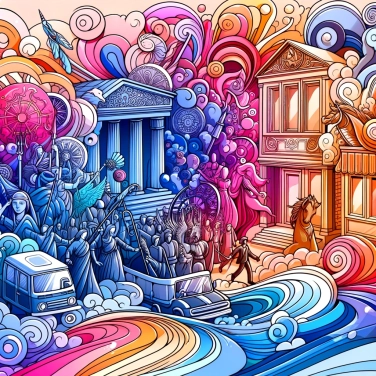In detail, for those interested!
The origins of the Trojan War
The Trojan War finds its origins in Greek legend, more precisely in an incident that took place during the wedding of Peleus, king of Aegina, and Thetis, a sea goddess. All the gods of Olympus were invited, except for Eris, the goddess of discord. To get revenge, Eris threw a golden apple with the inscription "To the fairest" at the reception. Hera, Athena, and Aphrodite claimed the apple, and Zeus decided that Paris, a Trojan prince, would be the judge of this beauty contest. Each of the goddesses tried to bribe Paris: Hera promised him power, Athena wisdom, and Aphrodite the love of the most beautiful woman in the world, Helen, the wife of the king of Sparta, Menelaus. Paris chose Aphrodite, triggering a series of events that would lead to the Trojan War.
The main figures and narratives of the Trojan War
The Trojan War is a major event in Greek mythology, featuring many iconic figures. Among them, we find Achilles, the great Greek hero known for his bravery and legendary anger. His confrontation with the Trojan prince Hector, symbol of Troy's resistance, is one of the key moments of the war. Paris, on the other hand, is at the origin of the conflict by kidnapping the beautiful Helen, wife of Menelaus, king of Sparta.
The gods of Olympus also interfere in human affairs during this war. Aphrodite supports Paris, while Athena and Hera take the side of the Greeks. Zeus, king of the gods, watches over the course of events.
The stories of the Trojan War have been passed down through the centuries, notably through the Iliad and the Odyssey, attributed to Homer, which have helped shape the collective imagination about this mythic period. These epic poems have highlighted the heroes, tragedies, and power struggles that marked the Trojan War, thus perpetuating the influence of this legendary episode on Western culture.
The cultural and literary heritage of the Trojan War
The cultural and literary legacy of the Trojan War is manifested through a multitude of artistic and literary works that have contributed to perpetuate the memory of this major event in Greek mythology. The tales of the Trojan War have inspired numerous writers, poets, and playwrights, both in antiquity and in the centuries that followed.
Among the most famous works, we can mention Homer's "Iliad" and "Odyssey," which have deeply marked Western literature. These Homeric epics have popularized the exploits of heroes such as Achilles, Hector, Odysseus, and Paris, thus contributing to perpetuating the fame of the Trojan War through the ages.
Over the centuries, the themes and characters of the Trojan War have been taken up and reinterpreted by many authors, particularly in Greek tragedy. The plays of Euripides, Sophocles, and Aeschylus often drew inspiration from the myths and legends surrounding the Trojan War, offering new perspectives on this mythological episode.
Furthermore, the cultural legacy of the Trojan War has also spread through visual arts, such as painting, sculpture, and mosaic. Many works of art depicting scenes from the Trojan War have been created over the centuries, contributing to perpetuating the imagination and symbolism of this event.
In conclusion, the cultural and literary legacy of the Trojan War is vast and diverse, reflecting the profound impact that this mythological episode has had on Western artistic and literary creation.
The influence of the Trojan War on Greek mythology
The Trojan War had a major influence on Greek mythology, shaping many stories and legends that have endured through the centuries. The iconic figure of Achilles, the great Greek hero, is inseparable from the Trojan War. His anger, his courage on the battlefield, and his relationship with Patroclus are all elements that have left a mark on Greek mythology.
Another essential character, Hector, the Trojan prince, embodies bravery and honor. His struggle against Achilles and his tragic death at the hands of the Greek hero have inspired numerous stories and epic poems.
The gods of Olympus also played a crucial role in the Trojan War. The rivalry between the deities, their intervention in the affairs of men, and their whims gave rise to complex and nuanced tales.
Furthermore, the fall of Troy and the famous Trojan horse have generated myths and legends that have persisted in Greek mythology. The cunning of Odysseus and the revenge of Agamemnon have been immortalized in literary works such as Homer's "Odyssey" and "Iliad."
Thus, the Trojan War deeply marked Greek mythology, contributing to enriching an important part of the cultural heritage of ancient Greece.
The impact of the Trojan War on Western literature
The impact of the Trojan War on Western literature has been immense. The epic tales of the battle have inspired numerous authors throughout the centuries.
One of the most famous works influenced by the Trojan War is of course "The Iliad", attributed to Homer. This Greek epic poem laid the foundations of Western literary tradition and deeply marked the collective imagination.
Virgil, in his work "The Aeneid", also drew inspiration from the Trojan War to tell the story of Aeneas, a survivor of the war who founded the city of Rome. This work contributed to shaping Roman identity and was a source of inspiration for many later writers.
During the Middle Ages, the legend of the Trojan War continued to fascinate authors, especially with the tales of the "Song of Roland" in France and the numerous adaptations of the Trojan material in Europe.
The Renaissance saw a renewed interest in Greek mythology, and the Trojan War was brought back into the spotlight with works such as "Troilus and Criseyde" by Geoffrey Chaucer and "Troilus and Cressida" by William Shakespeare.
Over the centuries, the Trojan War has become an essential element of Western literary culture, with adaptations, reinterpretations, and constant references to this legendary conflict.
![Explain why some countries change time zones?]()
![Explain why Alexander the Great refused to wear shoes.]()
![Explain why Alexander the Great always wore an impressive helmet.]()
![Explain why the last Chinese emperor was so young when he came to power?]()




















